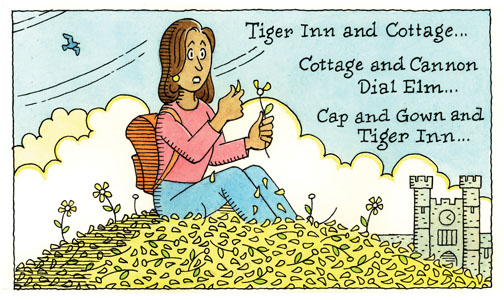Multiclub bicker, with some limits, to return to the Street in February
Come February, students will flock to Prospect Avenue as they have for decades, seeking admission to one of the 11 eating clubs. For the first time since the 1980s, however, there will be an option to bicker more than one club.
Tiger Inn, Cap and Gown, Cottage, and Cannon Dial Elm will participate in a new dual-club bicker system announced Nov. 7 by the Interclub Council (ICC). The other two selective clubs, Ivy and Tower, elected to keep their bicker processes. Charter, which uses a weighted sign-in system that allows students to increase their likelihood of admission by attending club events, also agreed to the dual-club system. A student could bicker a selective club and attend events at Charter.
The ICC said there will be more informational events for underclassmen, and all the clubs agreed to synchronize selection events, including bicker sessions, pickups, and initiations. All students will be informed of their club placement at the same time.
Before the start of bicker, students will rank up to two participating bicker clubs and as many sign-in clubs as they would like. A computer system will combine this information with the clubs’ admission decisions to match students with their highest available choice, according to ICC president Alec Egan ’13. (A computer-match system was one of many ideas suggested in May 2010 by the Eating Club Task Force.) As in the past, students will be able to sign into Cloister Inn, Colonial, Terrace, and Quadrangle the week before bicker.
Egan said he hoped that Ivy and Tower “can find a way to join the multiclub bicker aspect of the selection reform, but all of the clubs have taken huge steps to creating a more open process.” He said the ICC may increase the two-club limit in the future.
Tower president Jamie Joseph ’13 said club members were concerned about having enough time to interact with bickerees, while Ivy “focused on protecting the integrity of our 10-interview bicker process,” club president Jason Ramirez ’13 said.
Members of the Graduate Interclub Council (GICC) and four eating-club presidents worked to implement recommendations of the Eating Club Task Force, which was created by President Tilghman to examine the relationship of the clubs and the University.
“As alumni, we can look at this process with a great deal of satisfaction,” said GICC president Thomas Fleming ’69. He praised the University’s guidance during the process and sensitivity to the clubs’ independence.
The reforms do more than change “the way that one week works,” said University vice president and secretary Robert K. Durkee ’69, who chaired the task force. “Part of the story is to go back to a time when anyone who went into the system could have some confidence that at the end of the process, they would have a place [in a club].”













No responses yet